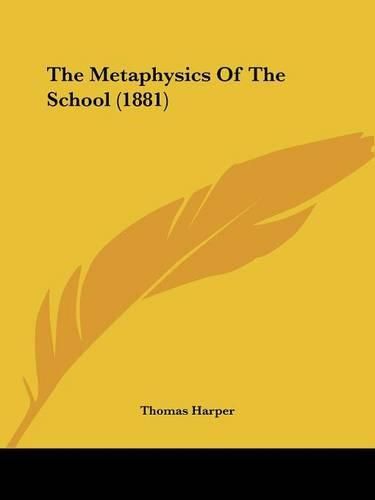Readings Newsletter
Become a Readings Member to make your shopping experience even easier.
Sign in or sign up for free!
You’re not far away from qualifying for FREE standard shipping within Australia
You’ve qualified for FREE standard shipping within Australia
The cart is loading…






Purchase of this book includes free trial access to www.million-books.com where you can read more than a million books for free. This is an OCR edition with typos. Excerpt from book: because such is the one determined effect of fire, as a cause, on the above-named subject. Note i. The Principle of causality docs not assert the necessity of an existing effect, by virtue of the existence of a potential cause ; but, inversely, affirms the necessity of an existing cause, supposing- inceptive or contingent Being, (which must, of its very nature, be an effect), to exist. Note 2. The reader will profit by reading the entire tenth Book on causation in the Fundamental Philosophy of Balmez, There is an English translation of this Work by Brownson (Sadlier and Co., New York). The Ultimate Principle In Ordee Of Reduction. As ideas, so analytical Judgments, or Principles, are reducible to an ultimate, of which the rest are simple determinations; under which, consequently, these latter are virtually contained. In the order of ideas, i.e. of simple Apprehensions, Being is the ultimate; since all other real concepts are truly determinations and contractions of this primary concept. Wherefore, Being virtually contains every form of reality,?or, to speak logically, every genus and every species,?within its transcendental periphery. Now, the present inquiry has been instituted for the purpose of determining which Judgment is,?and at the same time of showing that certain Judgments are not, (though they have been severally supposed to be),?the ultimate in the order of Principles. To begin with a definition of the subject: The ultimate Principle will be that analytical Judgment which explicitly exhibits the one motive of assent common to all other subordinate Principles; so that these latter may be established against sceptical assault by reduction to the former, as to the evident and immovable foundation of all complex or judicial thought. PROPOSITION CXX. The…
$9.00 standard shipping within Australia
FREE standard shipping within Australia for orders over $100.00
Express & International shipping calculated at checkout
Purchase of this book includes free trial access to www.million-books.com where you can read more than a million books for free. This is an OCR edition with typos. Excerpt from book: because such is the one determined effect of fire, as a cause, on the above-named subject. Note i. The Principle of causality docs not assert the necessity of an existing effect, by virtue of the existence of a potential cause ; but, inversely, affirms the necessity of an existing cause, supposing- inceptive or contingent Being, (which must, of its very nature, be an effect), to exist. Note 2. The reader will profit by reading the entire tenth Book on causation in the Fundamental Philosophy of Balmez, There is an English translation of this Work by Brownson (Sadlier and Co., New York). The Ultimate Principle In Ordee Of Reduction. As ideas, so analytical Judgments, or Principles, are reducible to an ultimate, of which the rest are simple determinations; under which, consequently, these latter are virtually contained. In the order of ideas, i.e. of simple Apprehensions, Being is the ultimate; since all other real concepts are truly determinations and contractions of this primary concept. Wherefore, Being virtually contains every form of reality,?or, to speak logically, every genus and every species,?within its transcendental periphery. Now, the present inquiry has been instituted for the purpose of determining which Judgment is,?and at the same time of showing that certain Judgments are not, (though they have been severally supposed to be),?the ultimate in the order of Principles. To begin with a definition of the subject: The ultimate Principle will be that analytical Judgment which explicitly exhibits the one motive of assent common to all other subordinate Principles; so that these latter may be established against sceptical assault by reduction to the former, as to the evident and immovable foundation of all complex or judicial thought. PROPOSITION CXX. The…